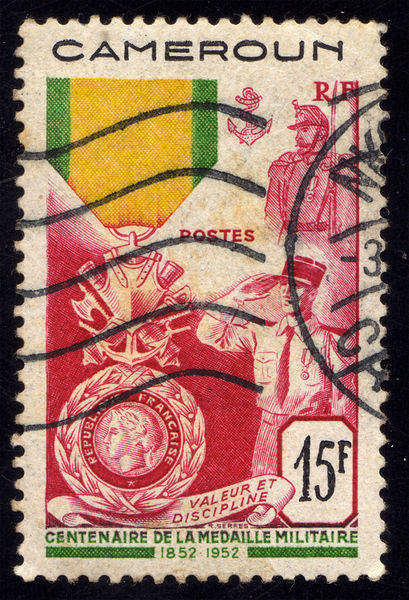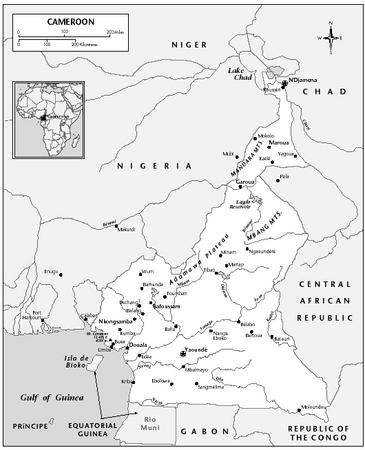Cameroon - History

Linguistic evidence indicates that the area now known as Cameroon and eastern Nigeria was the place of origin of the Bantu peoples. After the 12th century AD , the organized Islamic states of the Sudanic belt, especially those of the Kanem and Fulani peoples, at times ruled the grasslands of northern Cameroon. Small chiefdoms dominated the western highlands and coastal area. Portuguese travelers established contact with the area in the 15th century, but no permanent settlements were maintained. Slaves, however, were purchased from the local peoples.
The modern history of Cameroon began in 1884, when the territory came under German rule after the explorer Gustav Nachtigal negotiated protectorate treaties with the local chiefs. Although British missionaries had been active in the area since 1845, the UK recognized the German protectorate, called Kamerun, which included areas that were later to become British Cameroons and French Cameroun. During their occupation from 1884 to 1914, the Germans advanced into the interior, cultivated large plantations, laid roads, and began constructing a railroad and the port of Douala. When World War I broke out, the territory was invaded by French and British forces. After the war, one-fifth of the former German Kamerun, which was contiguous with eastern Nigeria, was assigned to the UK, and the remaining four-fifths was assigned to France under League of Nations mandates.
During the period 1919–39, France made notable contributions to the development of the territory. Agriculture was expanded; industries were introduced; roads were built; medical services were broadened; and more schools were established. Political liberty was restricted, however, and the system of compulsory labor introduced by the Germans continued. In August 1940, Col. Philippe Leclerc, an envoy of Gen. Charles de Gaulle, landed at Douala and seized the territory for the Free French. The birth of the Fourth French Republic and the UN trusteeship in 1946 signified a new era for the territory. French Cameroun was granted representation in the French National Assembly and the Council of the Republic. An elected territorial assembly was instituted and political parties were recognized, thus establishing a basis for Cameroonian nationalism.
Immediately after the setting up of the trusteeship in 1946, many parties began to emerge, but only one had effective organization and strength, the Union of Cameroon Peoples (Union des Populations du Cameroun—UPC). The party demanded immediate reunification of the British Cameroons and French Cameroun and eventual independence. In 1955, the UPC, accused of being under extreme left-wing influence, launched a campaign of sabotage, violence, and terror that continued sporadically until 1971, 11 years after independence. The death toll from this struggle has been estimated at between 10,000 and 80,000.
A new stage in self-government was reached in 1957, when the French government created the autonomous state of Cameroun, and Cameroonian institutions were created along the lines of French parliamentary democracy. In 1958, the Legislative Assembly of Cameroun voted for independence by 1960, and France and the UN General Assembly assented. In 1959, the last step in the evolution of political institutions prior to independence took place when a government of Cameroun was formed and given full internal autonomy. Ahmadou Ahidjo became prime minister. Earlier in the year, on 1 January 1959, the Kamerun National Democratic Party had won the general elections in Southern British Cameroons, and John Foncha had become prime minister. Soon Foncha and Ahidjo were discussing the possibilities of unification upon the achievement of independence.
On 1 January 1960, Cameroun became an independent republic. Fierce UPC-led riots in the Dschang and Nkongsamba areas caused Ahidjo to summon French reinforcements to suppress the rebellion, but intermittent rioting continued. A draft constitution was approved in a referendum of 21 February, and on 10 April a new National Assembly was elected. Ahidjo's Cameroun Union Party won a majority, and Ahidjo, who ran unopposed, was elected president in April 1960.
During 1960, consultations between Foncha and Ahidjo continued, and a proposed federation was tentatively outlined. On 11 February 1961, separate plebiscites were held in the Southern and Northern British Cameroons under the auspices of the UN. The voters in Southern Cameroons chose union with the Cameroun Republic, while those in Northern Cameroons opted for union with Nigeria, which was accomplished on 1 June 1961. During the months that followed, terrorist activity was renewed and the Cameroun Republic had to devote one-third of its national budget to the maintenance of public order.
A draft constitution for the federation was approved by the Cameroun National Assembly on 7 September 1961, and the new federation became a reality on 1 October. The Cameroun Republic became the state of East Cameroon, and Southern British Cameroons became the state of West Cameroon in the new Federal Republic of Cameroon, with Ahmadou Ahidjo as president and John Foncha as vice president. Both were reelected in 1965, but Foncha was later replaced as vice president, and the office was abolished in 1972.
A proposal to replace the federation with a unified state was ratified by popular referendum on 20 May 1972; the vote was reportedly 99.97% in favor of unification. A new constitution went into effect on 2 June, under which the country was renamed the United Republic of Cameroon. Ahmadou Ahidjo remained president of the republic; running unopposed, he was reelected for a fourth five-year term on 5 April 1975. In June, by constitutional amendment, the office of prime minister was created, and Paul Biya was appointed to the post. Ahidjo, reelected unopposed, began his fifth five-year term as president in May 1980. In November 1982 he resigned and was succeeded by Biya; Ahidjo remained head of the ruling party, the Cameroon People's Democratic Movement (CPDM).
Biya proved more independent than Ahidjo had anticipated. Following allegations of a military coup plot allegedly masterminded by Ahidjo, the former president retired to France in August 1983, and Biya became party chairman. Ahidjo was sentenced to death (later commuted to life imprisonment) in absentia in February 1984. Biya's own presidential guard attempted to overthrow the government in April; the rebellion was stamped out by the army. Purges followed, and 46 of the plotters were executed. A state of emergency was declared, which lasted several years. Late in 1984, the position of prime minister was abolished, and the name of the country was changed to the Republic of Cameroon.
Despite democratic reform begun in 1990 with the legalization of political parties other than the CPDM, political power remains firmly in the hands of President Biya and a small circle of CPDM members from his own ethnic group. Biya was reelected on 11 October 1992 amid accusations of voting irregularities. Biya reportedly got 39% of the vote to 35% for John Fru Ndi. (Ndi briefly proclaimed himself president before the government released the polling figures.) In contrast, the 1 March 1992 legislative election was considered free and fair by international observers, although many parties boycotted the elections and the CPDM won several constituencies by default. But even though opposition parties were well-represented in the legislature (92 of 180 seats), there were, according to the 1992 constitution, few legislative or judicial checks on the president.
Following the elections, civil unrest erupted as the population expressed the widespread belief that Ndi had won the presidential

elections. By late 1992, Ndi and his supporters were under house arrest and the international community had made clear its displeasure at the antidemocratic and increasingly violent turn the Biya regime was taking.
Biya agreed in May 1993 to hold a so-called Great National Constitutional Debate and in June he began preparing a draft of a new constitution to be adopted either by referendum or by the National Assembly. In 1994, 16 opposition parties formed a loose alliance, dominated by Ndi's Social Democrats, to work for constitutional and electoral reform. In October 1995, the CPDM reelected Biya as its leader. In December of that year the National Assembly adopted a number of amendments to address the power of the president. These reforms included a strengthening of the judiciary, the creation of a partially elected 100-member senate, the creation of regional councils, and the fixing of the presidential term to 7 years, renewable once. Strikes and demonstrations became commonplace as Biya resisted implementation of reforms. As of March 2003, the government had not established the Senate or regional councils.
The May 1997 legislative elections were marred by mismanagement, vote-rigging, and fraud, resulting in the Supreme Court's cancellation of results in three constituencies (seven seats). Based on the misconduct of these elections, the opposition boycotted the October 1997 presidential elections, in which Biya claimed victory with 93% of the vote. In 1998, Cameroon topped the German NGO Transparency International's list of the most corrupt countries in the world. Amidst international pressures and public outcries, Prime Minister Peter Mafany Musonge created an anticorruption body headed by a senior official in his office in May 2000.
Legislative and municipal elections were held on 30 June 2002. Opposition politicians made charges of fraud and vote-rigging. The Supreme Court ruled that the results of 9 constituencies were cancelled, and that new elections for these constituencies would be held on 15 September. In the end, the Cameroon People's Democratic Movement (CPDM)/Rassemblement Démocratique du Peuple Camerounaise (RDPC) won 149 of 180 seats.
In October 2002, the International Court of Justice ruled in favor of Cameroon in its territorial dispute with Nigeria over the oil-rich Bakassi peninsula. Fighting between the two countries over the region broke out in 1994, at which point Cameroon requested a world court ruling on the border dispute. The decision cannot be appealed.
Construction of a US $3.7 billion pipeline project from southern Chad to the coast of Cameroon—which is a joint venture between Exxon Mobil, Chevron Texaco, and Malaysia's Petronas—was underway in 2003. Nongovernmental organizations in Cameroon have cited environmental, social, health, and developmental concerns that need to be addressed before the pipeline becomes operational. Cameroon expects to receive US $500 million in pipeline transit fees, taxes, and dividends from the project, and another US $400 million in economic activity. The pipeline is expected to begin production by 2004.
I LOVee YOU KARi
i'm very happy with the way this story has been explain
that really make happy
thank's to every one who paticipated during the settings
But i keep asking my self will "will there be better stories to tell about Cameroon"?